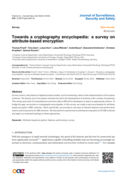New publication in Food Control [09.01.24]
Meta Leonie Boller und Christian Krupitzer vom Fachgebiet für Lebensmittelinformatik ist Co-Autor der Publikation "Qualitative assessment on the chances and limitations of food fraud prevention through distributed ledger technologies in the organic food supply chain" in Food Control (Impact Factor: 6 (2022)).The publication "Qualitative assessment on the chances and limitations of food fraud prevention through distributed ledger technologies in the organic food supply chain" by Meta Leonie Boller (Department of Foodinformatics (150L), and Computational Science Hub (CSH), University of Hohenheim, Stuttgart, Germany, and Fulda University of Applied Sciences, Fulda, Germany) with the co-authors, Annikka Zurwehme (Fulda University of Applied Sciences, Fulda, Germany), Christian Krupitzer (Department of Foodinformatics (150L), and Computational Science Hub (CSH), University of Hohenheim, Stuttgart, Germany) was published in Food Control, Elsevier (Impact Factor: 6 (2022)).
The prevention of food fraud is becoming more difficult in globalized supply chains that are increasing in their complexity. Information asymmetry is the major root cause of food fraud and especially problematic in products with value adding credence attributes, such as organic foods. Therefore, vulnerability mitigation is an important task for participants of the supply chain. As statistics show a rise in food fraud cases, certification schemes such as organic farming, fairtrade, or animal welfare are adapting their standards accordingly and can cause barriers to participation in such schemes. Distributed ledger technologies (DLT), such as Blockchains, hold the potential to supervise and manage supply chains and hold promising potential for reducing risk of food fraud from different angles. However, targeted orchestration of the different functionalities is to date missing in the organic food supply chain. This gap is addressed by this study, focusing on the extent to which DLTs can help prevent food fraud in organic-certified supply chains. The findings show that the technological capacity is further advanced than the readiness of industry stakeholders regarding technology adoption. Yet stakeholders approve of the potential benefits of introducing DLTs in their supply chains, which are scarcely used today. Policy schemes hold the potential to overcome current obstacles such as legal prerequisites and financials by fostering technology dissemination through different measures.
The publication is available at: www.sciencedirect.com/science/article/pii/S0956713523006473


